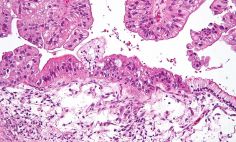Scientists like Christina Annunziata, M.D., Ph.D., at the Center for Cancer Research and others at the National Cancer Institute (NCI) are working hard to understand the ins and outs of ovarian cancer better to help women and save lives.
They have learned more about the risk factors and causes of the disease, and new ways of treating the cancer through advanced imaging and improved early detection.
Here are a few other key areas scientists at NCI and beyond are studying:
Genetic risk factors
One area of study involves the genes responsible for ovarian cancer that family members pass on. This research has already led to better ways to detect high-risk genes and assess a woman's risk of developing ovarian cancer. Scientists hope this research will also lead to new drugs that can prevent and treat it.
Researchers have developed mathematical models that help estimate how many years of life an average woman with a BRCA, or BReast CAncer gene mutation, might gain if she has her ovaries and fallopian tubes removed.
Early detection and prevention
Scientists are testing new ways to screen women for ovarian cancer with imaging techniques like functional MRIs and PET/CT scans, as well as how drug and lifestyle changes may alter the risk of ovarian cancer.
Other treatment areas
In addition to immunotherapy treatment work like that by Dr. Annunziata, cancer researchers are exploring new chemotherapy drugs and drug combinations that could result in more effective treatment for ovarian cancer patients.
How you can help future research
If you have or know someone with ovarian cancer or someone who is at risk, consider joining an NCI-supported trial near you. Learn more at cancer.gov.







